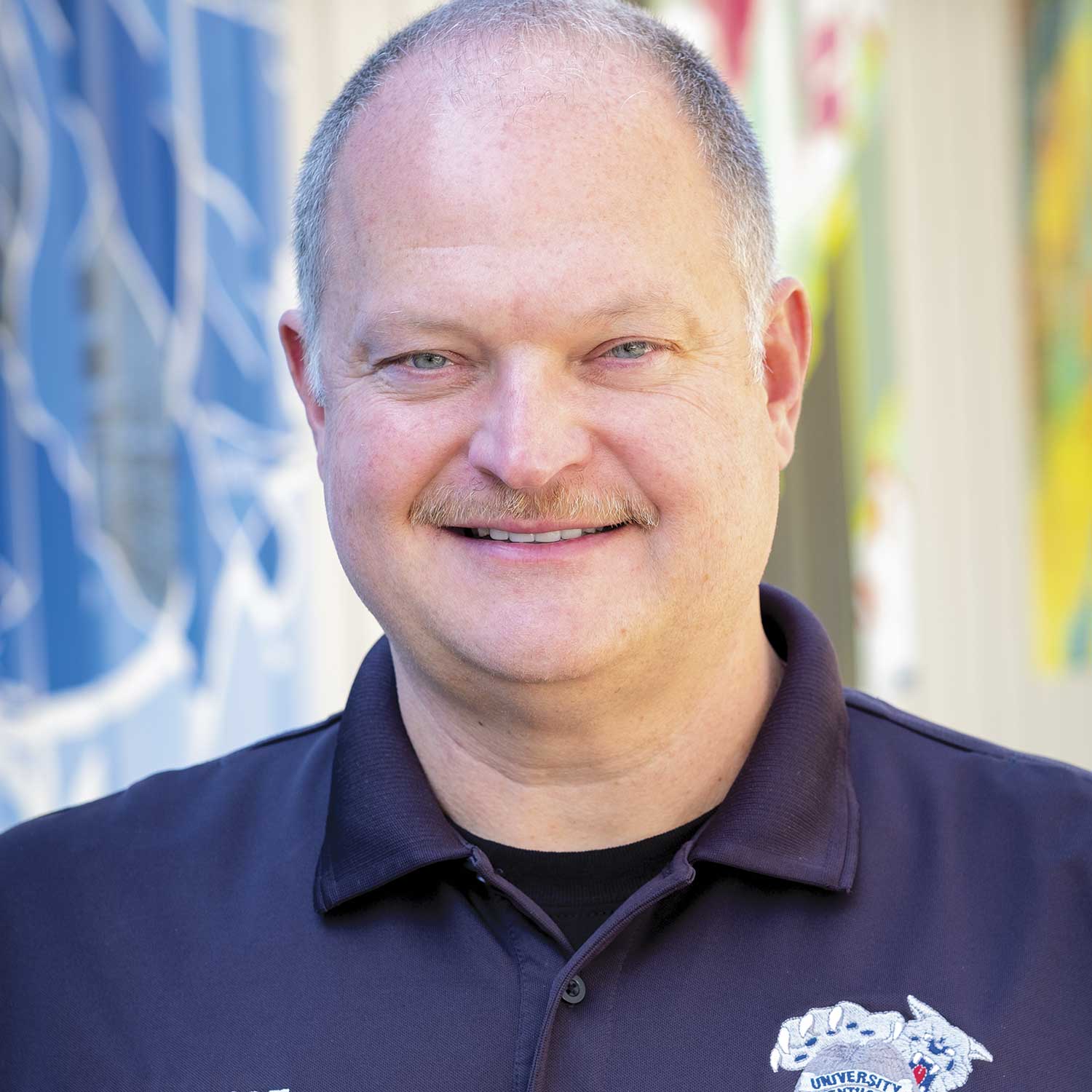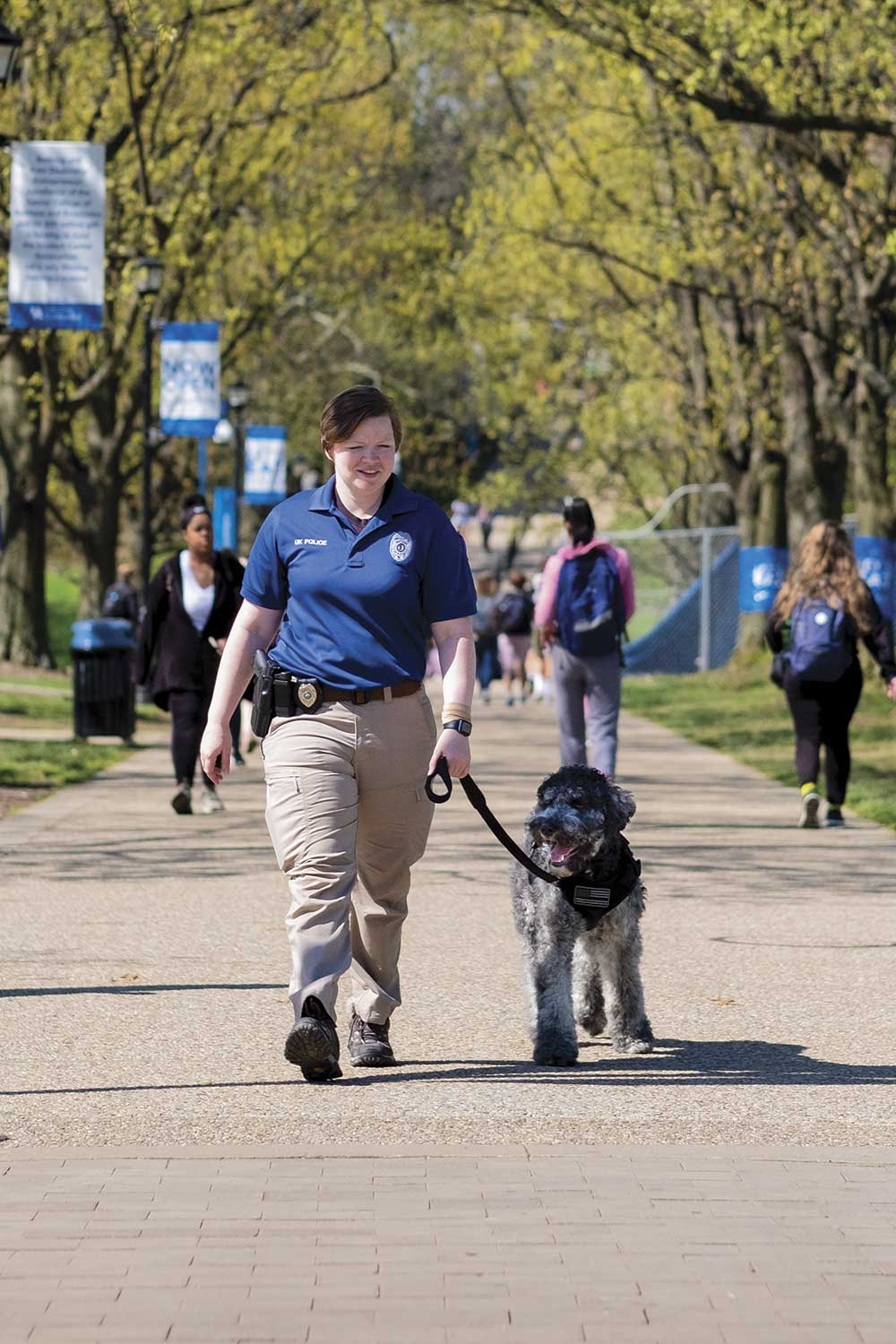A Paw to Lean On
PICTURED ABOVE
University of Kentucky Police Officer Amy Boatman poses with Oliver, the department’s therapy dog, inside Bowman’s Den on campus. The addition of a therapy dog played into the vision UK Police Chief Joe Monroe has for his department, who said Oliver will help bridge the gap between residents and police. (Photo by Jim Robertson)
At first glance, Oliver looks to be the farthest thing from a typical police K-9. In fact, the University of Kentucky Police Department’s newest K-9 is a 10-month-old, loveable, 60-pound – and growing – puppy that specializes in affection.
The Bouvier-Poodle mix joined UKPD in November 2017 and, unlike his K-9 counterparts, he isn’t interested in locating drugs or finding explosives. Oliver is a certified therapy dog. That means his personality is less like Cujo and more like Lassie.
The idea of bringing a therapy dog to UKPD was pitched to UKPD Chief Joe Monroe in early fall 2017 by Community Affairs Officer Amy Boatman.
“(Community affairs) sent a proposal to me after doing some research,” Monroe said. “I felt like it was a good avenue to open because it’s part of a whole concept I’m trying to transform the perception of police and the interaction with the public.”
The research into therapy dogs was part of Boatman’s master’s program research paper. As she delved deeper into the subject, Boatman saw a need for a therapy dog at UK.
“I did a lot of research on what that looks like in the environment we work in,” Boatman said. “Policing on a university campus is a little more unique with the age of students and rotation of students every four years.
“I saw the potential of the program, and after I did the research, I got the information to the chief, and told him this would be something that would benefit our department,” she added.
Partnership
Once the police chief signed off on the idea, Boatman and Oliver formed a partnership, which included extensive training.
“We’re certified as a team,” Boatman said. “We did a lot of obedience training to get used to each other and see if we were going to be compatible.”
In order to be certified, Oliver had to pass the Canine Good Citizens Test.
“We were certified with Pawsibilities Unleashed, and I had to turn in a list of the places I took Oliver that added up to 10 hours of observable work signed off by a supervisor,” Boatman said.
The training lasted 14 weeks through the Frankfort-based Pawsibilities Unleashed.
“It’s a non-profit group, and they train service and therapy dogs,” Boatman said. “In order to get certified, we trained for seven weeks – one night a week. Then we went ahead and completed another seven week training course because they specifically do therapy and service dogs. He’s getting a higher level of training, not just therapy training, but service dog training as well.”
Just about any breed can act as a therapy dog, Boatman said.
“It just depends on the temperament of the dog,” she said. “We specifically chose him because he is hypoallergenic, so when I visit the hospital, I’m not going to leave a trail of fur behind when I leave.”
Relationship Building
The addition of a therapy dog played into the vision Monroe has for his department, adding Oliver will help calm victims of crime or other stressful events where police are called in.
University of Kentucky Police Chief Joe Monroe said therapy dogs help calm the nerves of those who have experienced a crime or other stressful event. (Photo by Jim Robertson)
“It gives (victims) a chance to interact with the dog, pet the dog, and it calms their nerves and makes them feel a little bit more comfortable,” Monroe said.
Perhaps most importantly, Oliver has acted as a bridge that brings the community and the police department closer together, the chief said.
“One of the issues with policing nowadays is, many times, people don’t feel comfortable coming to the police and reporting things,” Monroe said. “What we’re really trying to do here at the University of Kentucky Police Department is transform that perception and break down those barriers and really find ways to communicate with the public. One of the ways we’re doing it is through the therapy dog program.”
The evidence has been tangible, Boatman said.
“The greatest impact has been the relationships we’ve built,” she said. “One of the students I’ve interacted with at the counseling center, I ran into her on campus and I didn’t have Oliver with me, but she still approached me and we had a positive conversation.
“She asked, ‘Where is policing right now? This is some stuff I’ve been hearing. What are you guys doing?’” Boatman said. “That’s what I really love to hear. So, beyond the emotional support and things that (Oliver) gives, it helps us build those relationships where we can positively talk about where policing is going and what we are doing with policing right now.”
Oliver is a regular at the counseling center, as he serves the student population by simply being there and being affectionate.
“I visit the center once a week, and let the students de-stress by getting a chance to pet the dog for an hour,” she said.
Another element that makes the program successful, Boatman said, is a large number of students who come to college often leave their pets back home. Oliver acts as a surrogate of sorts.
“They have pets back home that they miss,” she said. “Oliver serves as a little light, and they can pet a puppy. A lot of working dogs on campus you can’t pet because they are working, so he’s the one that they come up to pet.”
And pet, they do. During a morning stroll across campus, several pedestrians stopped to visit a few minutes with Oliver, who was decked out in his custom UKPD K-9 vest draped over his curly salt-and-pepper fur.
“Since I work in community affairs, he goes with me wherever I go,” Boatman said. “If I make a presentation or an event, he is an addition to those events. And we have events focused on him.”
Beyond Campus
Oliver’s services are not limited to campus, Monroe said.
“We go and read to the kids at schools or daycares, and Oliver goes to those schools and daycares and hospitals to visit them,” the chief said. “We don’t limit our community outreach to campus only because it is helping change the perception of police everywhere by us doing that.”
And the interaction with the children are especially “sweet,” Boatman said.
“We were at a childcare center the other day, and Oliver was interacting with a 4-year-old,” she said. “Well, Oliver really likes to give kisses and the kids really like that. This little kid wanted to give kisses back, so he started licking Oliver.
“It was a sweet moment with this kid, who is a special-needs child, because he was able to interact with the puppy and have a positive experience,” Boatman continued.
Taking Oliver into the University of Kentucky Chandler Medical Center helps brighten the day of patients and staff, Boatman said.
“Some of our biggest impact is at the hospital,” she said. “One in particular, you could tell when Oliver came into the room, it just changed everything that she was dealing with at that moment. Also interacting with the staff, that’s been great, too. They have stressful jobs just like we do, and coming in for 10 minutes and petting the puppy, that’s made a huge difference.”
The positive comments on Oliver are music to Monroe’s ears as he sees his vision catching on throughout the University of Kentucky community and beyond.
“That’s the whole principle – we’re trying to break down barriers of communication,” he said. “Not only with the university community but also with the broader community.”
Cutting-Edge Service
It is believed that Oliver is the first therapy dog used by a police department in Kentucky. A question posted on the Department of Criminal Justice Training’s Facebook page on the subject in early spring netted zero responses about the use of therapy dogs.
In fact, during Boatman’s research for her master’s research paper, the only agencies she found were out-of-state.
“One was in California and the other was in Illinois,” she said. “I contacted both agencies and asked how their programs were going and the one out of California was getting ready to add a second therapy dog. It has been a great impact for them. The one in Illinois had a puppy, so they’re working out the training on him.”
Bringing the dog on board is an example of UKPD’s commitment to the community, Monroe said.
University of Kentucky Police Officer Amy Boatman and UKPD therapy dog Oliver are often seen in and around campus. In early May, Boatman and Oliver walked down a sidewalk near Wildcat Alumni Plaza. (Photo by Jim Robertson)
“This is really on the cutting-edge of law enforcement,” he said. “This is one of several innovative programs we’ve initiated. We’re the first in the state, along with our LGBTQ liaison position we started last fall. Those are all innovative things we took steps in doing to open that line of communication, which is important in today’s policing.”
One of the great things about the therapy dog program is the bang for very little buck, Monroe said.
“As far as a return on an investment, hands down, it’s a great investment,” he said. “It’s not the typical high cost that you have in acquiring a working dog for a police department.”
The chief said departments can spend several thousands of dollars acquiring and training dogs for narcotics and explosives, but it’s not the case with dogs like Oliver.
“With a therapy dog, there is no ongoing high cost in training that you see with working dogs,” he said. “The return on investment that you put into and what you get back from breaking down those barriers of communication … it’s worth it. Everyone wants to pet Oliver.”
Five Health Benefits of Therapy Dogs
- Lowering blood pressure - High blood pressure is often associated with rapid heart rate, anxiety, or stressful life. In many cases, such conditions are mainly psychological problems which can be cured by certain therapy methods. It is a fact that petting a dog can create positive emotional connections such as friendship and affection.
- Lowering levels of Epinephrine and Norepinephrine - Epinephrine and Norepinephrine are both important neurotransmitters which are highly essential hormones in the brain. They are nervous-system stimulants; the human body needs the proper level of these substances to reduce depression and/or anxiety.
- Reducing patient anxiety - Therapy dogs often visit hospitals and other health institutions. Many hospitals are greatly helped by the animals in reducing patients’ anxieties before certain health examinations, for example MRI scanning.
- Increasing the level of endorphins - One of the greatest benefits of therapy dogs is increasing the level of endorphin. It is a natural substance produced by the body, which works by manipulating the perceptions of pain or stress.
- Increasing the level of oxytocin - Other benefits of therapy dogs are that the animals can boost happiness, improve empathy, stimulate better bonding, and promote a happier life through simply increasing levels of oxytocin.
Source: http://www.therapydogcertification.com/5-health-benefits-of-therapy-dogs/









